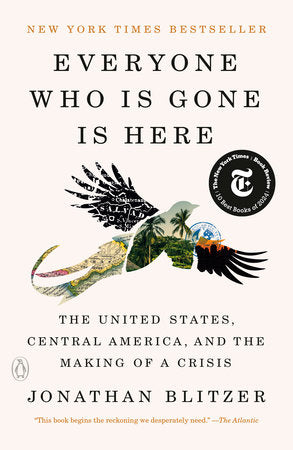Everyone Who Is Gone Is Here: The United States, Central America, and the Making of a Crisis
Everyone Who Is Gone Is Here: The United States, Central America, and the Making of a Crisis
by Jonathan Blitzer
Couldn't load pickup availability
Share

About the Book
A National Bestseller • A New York Times Top 10 Book of 2024 • One of Barack Obama’s Summer Reading List Picks • Named a Notable Book by New York Times, Washington Post, and Chicago Tribune • Nominated for the Carnegie Medal for Excellence and the Baillie Gifford Prize for Non-Fiction“
What an incredibly thorough documentation of the causes of the immigration crisis, the discussions that have been going on through multiple administrations.” —Jon Stewart, The Daily Show“
Everyone Who Is Gone Is Here is sure to take its place as one of the definitive accounts of the U.S. and Central American immigration puzzle. . . . Hopefully, those with the power to change things will listen.” —Manuel Roig-Franzia, Washington Post
An epic, heartbreaking, and deeply reported history of the disastrous humanitarian crisis at the southern border told through the lives of the migrants forced to risk everything and the policymakers who determine their fate, by New Yorker staff writer Jonathan Blitzer
Everyone who makes the journey faces an impossible choice. Hundreds of thousands of people who arrive every year at the US-Mexico border travel far from their homes. An overwhelming share of them come from El Salvador, Guatemala, and Honduras, although many migrants come from farther away. Some are fleeing persecution, others crime or hunger. Very often it will not be their first attempt to cross. They may have already been deported from the United States, but it remains their only hope for safety and prosperity. Their homes have become uninhabitable. They will take their chances.
This vast and unremitting crisis did not spring up overnight. Indeed, as Blitzer dramatizes with forensic, unprecedented reporting, it is the result of decades of misguided policy and sweeping corruption. Brilliantly weaving the stories of Central Americans whose lives have been devastated by chronic political conflict and violence with those of American activists, government officials, and the politicians responsible for the country’s tragically tangled immigration policy, Blitzer reveals the full, layered picture for the first time.
Everyone Who Is Gone Is Here is an odyssey of struggle and resilience. With astonishing nuance and detail, Blitzer tells an epic story about the people whose lives ebb and flow across the border, and in doing so, he delves into the heart of American life itself. This vital and remarkable story has shaped the nation’s turbulent politics and culture in countless ways—and will almost certainly determine its future.
About the Author
Jonathan Blitzer is a staff writer at The New Yorker. He has won a National Award for Education Reporting as well as an Edward R. Murrow Award, and was a 2021 Emerson Fellow at New America. He lives with his family in New York City.
Editorial Reviews
“If anyone is well placed to take on the agonizing story of America’s southern frontier it is Jonathan Blitzer, a writer for the New Yorker who has spent the best part of a decade reporting from there. The quotes from Reagan’s White House are among the many diamond-stud details in Everyone Who Is Gone Is Here, Blitzer’s sweeping history of humanitarian crises on the US-Mexico border, and of the politics of immigration in Washington . . . What could be a complex story is a stunning epic woven around the lives of four individuals seeking sanctuary from the death squads and murderous gangs that at different times dominated their homelands . . . While at times this is implicitly an indictment of the sometime short-termism and cynicism of Washington’s foreign, security and immigration policy, this is a novelistic account rather than a tract, and his tale is beautifully told. All four characters, whose lives he has followed over many years, linger in the reader’s mind.” —Financial Times
“Sweeping and insightful . . . a New Yorker magazine writer who for years has been one of the most perceptive chroniclers of a complex and often misunderstood bane of U.S. policymakers. Writing with clarity and grace, while avoiding the mawkish tone sometimes associated with tales of the border, Blitzer makes a compelling case that the United States and Central America are knit as one . . . The themes explored in the book feel all the more relevant as we enter a presidential campaign in which immigration is once again a centrally toxic issue . . . Far from reading like a dry policy tome, Blitzer’s book makes its case by telling in vivid detail the stories of a cast of representative figures spread over five decades . . . Everyone Who Is Gone Is Here is sure to take its place as one of the definitive accounts of the U.S. and Central American immigration puzzle, a long and ongoing saga with no real solution in sight . . . And yet, after reading Blitzer’s book, one can’t help but think that the impossible might be possible—that maybe, just maybe, this could be fixed. He’s not trying to lay out a set of policy solutions. He’s making a more nuanced plea, a rejection of the ‘selective amnesia’ of politics in favor of a deeper understanding of how we—as a nation and as a region—got here. It is a book with a ‘mission’ . . . Hopefully, those with the power to change things will listen.” —Manuel Roig-Franzia, Washington Post
“As Jonathan Blitzer shows in Everyone Who Is Gone Is Here, his timely and instructive history of the immigration crisis, the trouble at the border isn’t likely to be solved soon, since it is the outcome of a long and vexed entanglement between the United States and its southern neighbors . . . Conflicts over immigration often arise from similarity rather than difference, and the strangers at our border have a familiar history that Blitzer tells in meticulous and vivid detail. It is our own.” —Matthieu Aikins, The New York Times
“What we’re seeing today on the southern border and in cities including New York, where more than 100,000 migrants arrived in the past year—are reverberations of a long, violent history that implicates the United States for its meddling in Central America. This is the story that Jonathan Blitzer painstakingly documents in his new book, Everyone Who Is Gone Is Here . . . Blitzer shows all the ways our immigration system is in shambles. A series of misguided actions and their consequences brought us to this point. This book begins the reckoning we desperately need.” —The Atlantic
“Capacious, stirring . . . Blitzer assiduously chronicles this dark history with a keen eye for individual lives; the personal is literally political . . . Blitzer’s research and reporting are extensive and impeccable, a feat in an age of TikTok memes and Twitter mobs. But perhaps his most resonant, if damning, argument is just how oblivious Americans have been—and still are—to widespread suffering committed in our name. Out of sight, out of mind. Blitzer never shirks from his duty: to show us who we truly are. His is a vital, momentous book.” —Minneapolis Star Tribune
“The new book every American needs to read before they vote . . . The masterstroke accomplishment of Everyone Who Is Gone Is Here is the way that Blitzer weaves the gripping stories of refugees with the 45-year history of policymaking in Washington, where elected officials and key bureaucrats—some craven and nakedly political, others well-meaning—repeatedly fought the wrong wars and worried about the wrong things to spin the tangled web of policies that caused a humanitarian nightmare.” —Philadelphia Inquirer
“Blitzer painstakingly recounts the brutal circumstances behind this mass exodus, emphasizing the humanity of the people who uprooted their lives in search of safety in the US, only to find themselves criminalized in the very country they hoped would be their refuge . . . Blitzer has a magazine writer’s keen attention to detail, and while the larger policy decisions of the United States are never far from the book’s narrative, he also turns his readers’ attention to the people whose lives are affected by them. His aim, he tells us, is ‘to be a kind of go-between: to tell each side’s story to the other’ and to allow migrants ‘to participate, for once, in the privileged backroom conversations that decide their fate.’” —The Nation
“What an incredibly thorough documentation of the causes of the immigration crisis, the discussions that have been going on through multiple administrations.” —Jon Stewart, The Daily Show

